Settlement Negotiation: Can Kindness and Respect Move the Needle?
As a young trial lawyer in the 1980’s I had a take no prisoners approach when negotiating. The theory was that you only show strength, never weakness and power your way to convincing the other side of the value of your case.
Validate or show respect for your adversary’s arguments? Blasphemy!
Smile and just be chill when negotiating with your adversary? Not in warfare!
Decades later, and now into a second career in the alternative dispute world, I have become fascinated with the art and science behind dispute resolution. Not how to bully and muscle one’s way to a result but the psychology and sociology involved in interpersonal dispute resolution.
To be sure, this short essay is not intended to be a primer on negotiation strategies. Rather, simply an attempt to start the conversation by throwing out two simple constructs that may assist you and your adversary to find common ground. Performed in sequence, they may make a difference.
The first is almost downright silly, except that the science behind it is deep: when you negotiate, do so while you are in a good mood, smile, and express a general state of optimism.
The science behind much of this is owed to the pioneering efforts of Dr. Martin Seligman who introduced the term “positive psychology” in the late 1990’s which, generally speaking, involves the conditions of thriving and happiness. There is quite a bit of research and discussion in the literature about the multi-dimensional interconnectedness between a base state of happiness and conflict resolution.
The premise here, backed by peer reviewed scientific studies is simply: when communicating with “the opposition” over the phone, in court or at a mediation, if you express a positive “energy” (show an upbeat mood, smile, display optimism or a positive affect) it will positively affect the mood and attitude of those with whom you are engaging.
Now for the harder part: Once you have “the opposition” in a good mood, go in for the score by killing them with kindness. In this case respect and validation.
In this context the word validation is the recognition and acknowledgement of your opponent’s positions. It does NOT mean acceptance of their often adverse perspective, just that you understand their points of view. Even more so, and as difficult as this may seem, you acknowledge that their position may be a winner for the jury.
Take for example, an automobile accident, where the plaintiff doesn’t complain of hip pain for 6 weeks post-accident and then has a hip replacement a year later. Both sides are far apart in negotiations- the defense is steadfast that they simply don’t believe the causation argument; plaintiff’s counsel is adamant that the hip surgery is accident related.
How to handle? One option is to tell opposing counsel that they are wrong, the hip surgery is or is not related to the accident because of x, y and z, and you will prove it to a jury. One wonders if they are listening or looking at you simply as a talking bobble head. Another option, is to start out by telling them that you understand why they see it that way, and in fact a jury may in fact also agree.
YIKES! How counterintuitive to say this!
The key here is what your validation will do to opposing counsel’s emotional state. Experience and logic dictate that your acknowledgment of their position may make them see you as more honest, candid and believable. Hopefully, respect starts to creep into a relationship that by definition is adversarial. Now you have an opponent who may be more openminded to hear your points and arguments and why you think you can prove or disprove causation. Simply put, validation of a thought, feeling or position of someone adverse can and often should open them up to listen to what you have to say. And open communication is critical to finding compromise.
While you are at it, why not throw in general respect into the equation: respect for your opponent, their job, the pressures they are under, etc. We all want to be appreciated and understood. This can be accomplished in a single conversation, but is more effectively culled over time. While it again seems like common sense, it’s hard to argue against the proposition that if an adversary respects you, they will trust you more, which means they will be more receptive to your arguments. Here again, the literature is replete with discussions about the relationship between perceived regard (how one perceives they are regarded by another) and conflict resolution.
Summary
Let’s be candid- these are tough times, politically and otherwise. Folks who disagree are hardly communicating, and scarcely listening to each other. Trust, respect, and even kindness seem to be at a premium. Most of us could do much better at engaging with those with whom we disagree.
The ideas expressed above, that bringing positive energy to the table, that respecting those who are adverse to us and validating thoughts or expressions that we don’t agree with, can go a long way in bridging gaps and create an opportunity for constructive conversation.
This holds true in our adversarial litigation world as well as in society in general.
¹ See generally Martin E.P. Seligman & Mihaly Csikszentmihalyi, Positive Psychology: An Introduction, 55 AM. PSYCHOLOGIST 5 (2000)
² See generally Arthur Pearlstein, Pursuit of Happiness and Resolution of Conflict: An Agenda for the Future of ADR, 12 Pepp. Disp. Resol. L.J. Iss. 2,(2012)
³ See generally, Pugh, S. D. (2001). Service with a smile: Emotional contagion in the service encounter. Academy of Management Journal, 44, 1018–1027; it also is healthy for the smiler- https://www.nbcnews.com/better/health/smiling-can-trick-your-brain-happiness-boost-your-health-ncna822591
⁴ Thomson, Overall, Cameron, Low (2018), Perceived Regard, Expressive Suppression During Conflict, and Conflict Resolution, 2018, Vol. 32, No. 6, 722–732, http://dx.doi.org/10.1037/fam0000429

